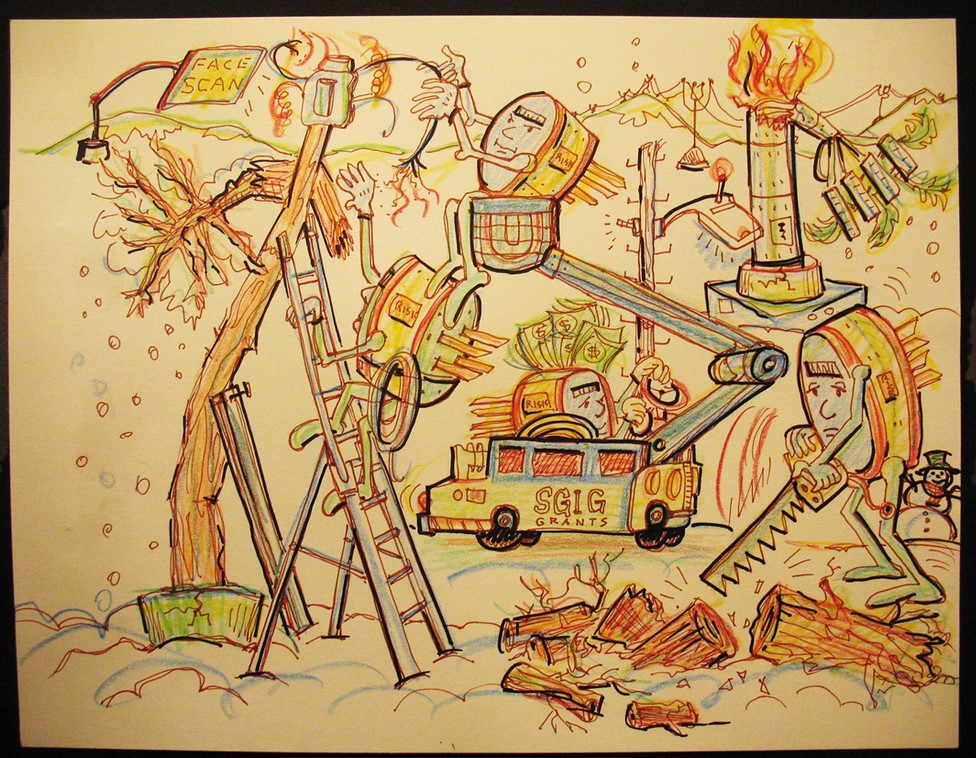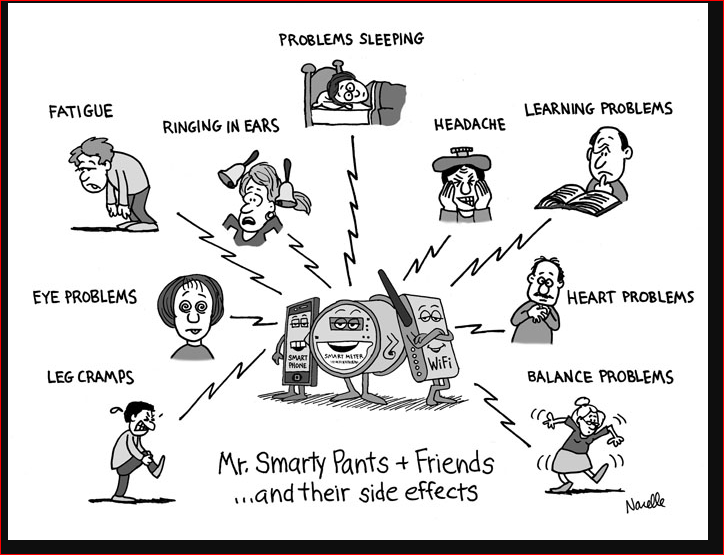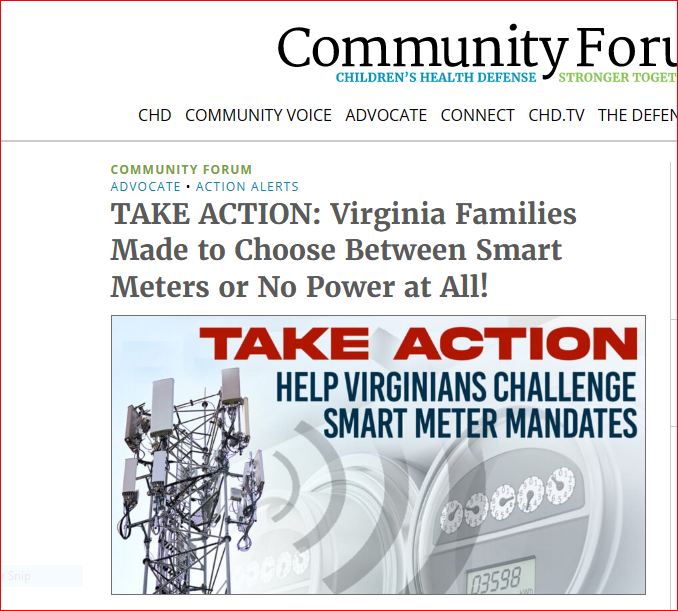“Smart” Meters, Faster Storm Outage Restoration? Safe? Secure? Reliable? – Not! Maine and Virginia
 By Patricia Burke of Safe Tech International, with Ed Friedman of Maine Coalition to Stop Smart Meters. Image Courtesy Floris Freshman
By Patricia Burke of Safe Tech International, with Ed Friedman of Maine Coalition to Stop Smart Meters. Image Courtesy Floris Freshman
“Until smart meters can dial utilities promptly and persistently, wield chainsaws, drive bucket trucks, splice lines and convince trees not to fall on power lines, these primary smart meter benefit claims remain more myth than fact. Smart meters are just not that smart. Utility salespeople, however, are.” – Ed Friedman
It’s wintertime, and on December 18, 2022, WABI Channel 5 Central Maine posted the headline: “First major snowstorm of the season leaves thousands without power.” Again.
“Maine (WABI) – Maine’s first major snowstorm of the season brought heavy, wet snow, causing power outages across the state.
Power companies continue to restore power for customers impacted by the storm that hit the area Friday and Saturday.
Central Maine Power has more than 1,500 line and tree workers out Sunday restoring power.
More than 120,000 customers lost power due to the storm and as of 9 a.m. Sunday approximately 72,000 had been restored.”

Remember that in 2017, as reported by Maine Public, an “October Windstorm Took Down CMP’s $200 Million Smart Meter Network.”
“When power went out to some half a million Mainers after the October windstorm, another system went down too — Central Maine Power’s $200 million smart-grid communications network that, among other things, was supposed to improve outage communications and storm recovery.
About seven years ago, CMP started installing new smart meters on more than 600,000 Maine homes and businesses as part of its Advanced Metering Infrastructure program. With roughly half of the AMI to be funded through a federal grant and half by customers, state regulators approved the investment because it promised a host of money-saving and other benefits. {} as utility poles went down in the storm, it wasn’t just power lines that got taken out — so did radio transmitters for the wireless smart-grid “mesh” that were installed at the top of the poles. Meters themselves lost power, and over time battery backup power for some components was drained.
By Tuesday the network’s performance was down by more than half.
CMP’s customer communication systems were significantly degraded, with customers reporting inaccurate or spotty outage information and restoration estimates on the company’s website, through the smart-meter web portal and through email or text messages.
The company couldn’t “ping” meters to verify their status. But CMP officials say it did not slow the actual storm response.”
“Having 405,000 smart meters not talking to us when they had no power doesn’t change how we manage the storm,” says CMP CEO Sara Burns.
As many critics of smart meter myths note, not having the meters communicating didn’t change how the storm was managed, because, as noted by Ed Friedman, “I always used to say that until smart meters can handle a chain saw they won’t be very useful or stand up to the utility claims in getting power back on sooner.”
Maine Public noted, “Well this was a colossal system failure,” says state Rep. Seth Berry, a Bowdoinham Democrat who co-chairs the Legislature’s Committee on Energy, Utilities and Technology. “It was a total and, until now, unrevealed failure of a system that CMP used to increase profits to its foreign shareholders and to lay off lineworkers and meter readers. Importantly, it was costly to ratepayers because just like we paid for AMI in the first place with interest, Maine residents and businesses are on the hook for the vast majority of the cleanup costs, with interest.”
Myths: The first benefit to smart meters as listed by the California PUC is greater outage detection and faster restoration of service.
“Allows for faster outage detection and restoration of service by a utility when an outage occurs and therefore, less disruption to a customer’s home or business.”
These supposed attributes are discussed in great detail by NEMA, the National Electrical Manufacturers Association
Smart Meters Can Reduce Power Outages and Restoration Time…
Even suggesting that smart meters can help avoid outages…
Tools that reduce the number of sustained outages include trimming trees, maintaining the grid, and deploying automation to restore service.
Central Maine Power says:
Smart Meters offer convenience and savings for you, including:
Pinpointing power quality issues allows for faster diagnosis and response.
Identify outages faster when big storms hit and verify when power has been restored.
Baltimore Gas & Electric hedges their bets…
Q. I’ve heard that smart meters will automatically notify the utility when there is an electrical outage. Does that mean customers no longer have to call to report outages?
A. In the near future, smart meters will provide information that will help alert BGE about outages. However, we will still ask customers to call and let us know when they are experiencing an outage in their home or neighborhood. When customers call, they can also provide us with important information about downed power lines or anything else they may observe that could help our restoration efforts.
Maryland Smart Meter Awareness Explains: Smart Meters and Power Outages: Myths and Realities
“During Hurricane Sandy, we heard utility spokespeople claim that smart meters would help in the event of a storm by enabling the utility to see immediately the location of all outages rather than having to wait for thousands of phone calls. This claim is misleading because the problems in restoration of service are not due to the utilities’ lack of knowledge about where the outages are, but rather to the number of outages and how prepared the utilities are to deal with them. The reason for long waits for restoration of service has to do with how many outages occur and how prepared the utility is to deal with them. In addition, the utilities do not restore power on a “first come, first served” basis. Utilities triage restoration so that their efforts bring the most people back on line in the shortest possible time. Thus regardless of how BGE becomes aware that you lost your power, you will still have to wait until you have a high enough priority before BGE restores your power. Having a smart meter is this situation will make little, if any difference in the time it takes to get your power restored.
One way to prevent widespread outages and to make restoration more effective would be to upgrade the infrastructure of the entire electric grid, an endeavor that is long overdue. This might include, for example, more underground wires and keeping those above ground in better repair. Quite obviously, a robust system that prevents outages to begin with would be far better than an alarm system that notifies the utilities of failures once they occur. As for the unavoidable outages that may still occur, utilities might take the following measures:
Have parts available rather than waiting until a storm to start looking for these
Have extra crews in place before a storm
Maintain and upgrade infrastructure on a regular basis
Clearly, restoration of service does NOT depend on having a smart meter on one’s house. The utilities’ ability to look at a computer to identify all the outages is not the key factor that will speed restoration. In other words, the absence of smart meters has not prohibited timely restoration of service. In fact, the opposite might be true, for two reasons:
Allocating funds for smart meters makes it less likely that sufficient money will be available for addressing infrastructure related problems that cause outages in the first place
A wireless smart grid poses serious hacking and cyber security risks that render our power system far more vulnerable to maliciously being taken down which is not the case with the current system. This concern has been voiced repeatedly by top security experts. Thus, in deploying a wireless smart grid, we are actually opening up the likely possibility that our power system can and will be hacked into, and that more devastating outages will occur once the smart grid is in place. Instead of outages being only weather related, they will now be linked to hacking and cyber security issues as well, thus requiring yet more money to keep up with technology and security breeches.
The question to consider is: What possible benefits might smart meters have for consumers during a storm? And do these benefits outweigh the many problems posed by smart meters? [ ]
Even if smart meters did perform as claimed by the utilities, (which has never actually been demonstrated during outages where smart meters have been installed) for consumers who are aware of the dangers of wireless smart meters, the option of calling in their own outage is far preferable to dealing with all of the health, safety, fire, security, and privacy issues that surround these meters.
Therefore, being spared the trouble of making a phone call and/or saving some minimal, if any, amount of time for the utility to become aware of their outage, is a tiny, insignificant benefit compared to all the risks posed by having the meter. No truly informed person would ever make this choice.
If a smart grid is necessary at all, then a fiber-optic grid, which at least reduces health, security, and hacking issues, should be employed.
In summary, the claim that smart meters are going to help consumers during storms is deceptive. Smart meters do not expedite restoration. The money being invested in smart meters — which benefit only the utilities — should instead be invested so as to truly benefit the ratepayers, namely in infrastructure upgrades which would prevent outages from occurring in the first place.” – Maryland Smart Meter Awareness
Managing trees, maintaining the grid, rolling trucks, adequate training, parts inventories, and workers with chainsaws, and not ‘smart’ meters, addresses storm-related outages.
(Smart meters provided a gift that keeps on giving to utilities due to planned obsolescence. What is reliable is increased costs over time.)
In addition to all of the other reasons not to like ‘smart’ meters...

History (Still) in the Making: Opposition to Enduring Abuse of ‘Power‘ Literally: No Electricity For Failure to Obey
Smart meter harm reports dating back more than a decade are documented at many state-based websites, as well as at Stop Smart Meters, EMF Safety Network, Smart Meter Harm, and Smart Grid Awareness.
Also note the industry shifting its campaign from claims of ‘reliability’ to ‘resiliency’ when the ‘reliability’ claim fell flat. Most so-called ‘environmental’ groups have been on the wrong side of the smart meter debate, presuming that the supposed benefits justify the abuses of power, and overrun of human and community rights, and ignoring the safety, security and environmental justice issues, not to mention, violations of privacy.
Virginia Residents Without Power, For Refusing a ‘Smart’ Meter
“Despite freezing temperatures and with little to no warning, Dominion Energy Virginia showed up at the homes of more than half a dozen families in Virginia and shut off their power because they refused to have “smart” meters installed in their homes.”- CHD
Read more about the plight of Virginia residents reported by the Children’s Health Defense, and take action to help here:

Watch “The Children’s Health Defense” People’s Testaments episode here.
Learn More: SAY NO TO “SMART” METERS – Virginians for Safe Technology
Utilities and their partners, including regulators, might be trying to keep the public in the dark, in more ways than one, for example, with lies of omission about how often the meters transmit RF and withholding electicity from customers needing to choose between electric service and health.
It’s not working. There are too many good people who care too much about each other. Be one of them and send the form: TAKE ACTION: Virginia Families Made to Choose Between Smart Meters or No Power at All! • Children’s Health Defense (childrenshealthdefense.org)



